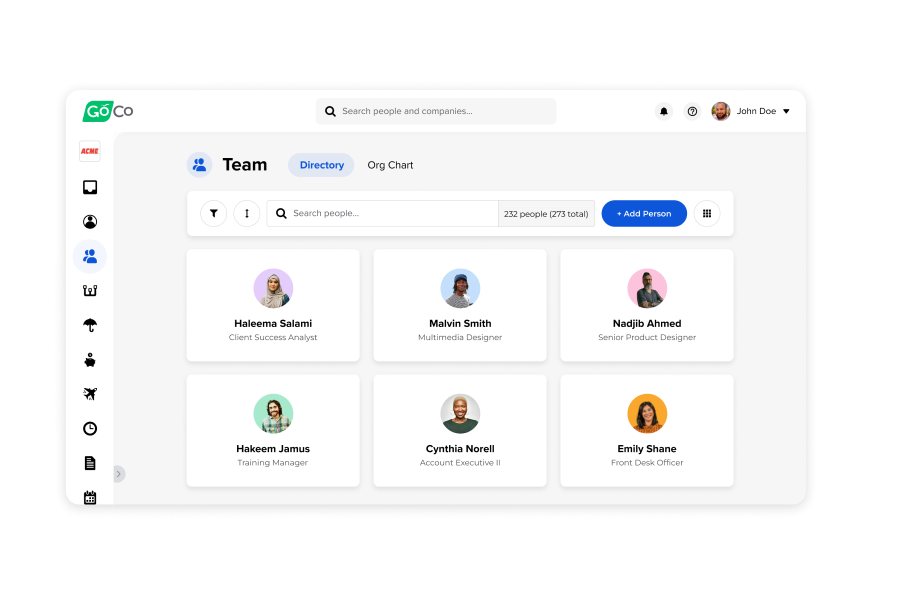What is an HRIS? A Guide to Modern HR Software and Implementation
Switching to a modern HRIS can save hours of time each week and thousands of dollars annually. But what exactly does it do?
by Anna Coucke - April 10th, 2024
If you are looking for ways to streamline your HR processes and free up valuable time for your HR team, a Human Resources Information System (HRIS) can be the answer you have been searching for.
Switching from manual processes and outdated technology to a modern HRIS can save hours of time each week and thousands of dollars annually. But what exactly does it do?
Read on to learn exactly what an HRIS is capable of, and how you can find the perfect solution for your company.
What Exactly is an HRIS?
An HRIS is a software program that allows businesses to manage and automate many different tasks related to employees, including payroll, benefits, and time tracking.
HRIS programs have been around for a while, first emerging as closed on-premises software solutions in the 1980s. However, today’s modern solutions are typically cloud-based and allow employees to self-service many of their tasks, freeing HR professionals to focus on more strategic initiatives, such as employee engagement.
What are the Features of an HRIS?
An HRIS acts as a central hub for all employee data, ensuring accuracy and easy access. From core HR information management to employee self-service portals, an HRIS can automate many HR processes that were previously done manually or across multiple platforms, saving time for both HR staff and employees.
While each provider may have slightly different offerings and capabilities, here are some of the key features you can expect in an HRIS:
Employee Self-Service: A self-service portal empowers employees to take charge of their HR information, allowing them to access paystubs, update personal details like addresses, and manage benefits selections. Some HRIS providers like GoCo have even begun incorporating AI technology into their platforms to help answer basic employee questions, further freeing up HR's time while also fostering a sense of ownership and transparency for employees.
Recruitment and Onboarding: Attracting top talent is crucial. An HRIS with an integrated Applicant Tracking System (ATS) can streamline the process by managing applications, scheduling interviews, and keeping track of candidate pipelines. Onboarding new hires becomes smoother, too, with features to electronically send and complete paperwork, assign training modules, and integrate with other company systems.
Payroll Processing: An HRIS ensures timely and accurate employee payouts with automated payroll. In addition to storing direct deposit, employment, and payment information, an HRIS can handle other payroll tasks such as tax withholdings and PTO calculations, reducing the risk of errors and saving HR significant time and effort.
Benefits Administration: Managing employee benefits can be complex. An HRIS simplifies this by allowing electronic enrollment and deduction tracking. This ensures employees have easy access to their benefits information and helps them understand their coverage.
Time Tracking: With an HRIS, you can easily keep track of employee work hours, overtime, and paid time off. This data can be seamlessly integrated with payroll for efficient processing and helps identify trends in scheduling or potential overtime issues.
Performance Management: Setting clear and actionable goals, tracking progress, and conducting performance reviews are all essential for employee development. An HRIS can facilitate this by providing a platform for goal setting, performance feedback (including 360-degree options in some systems), and documentation.
Reporting and Analytics: Data-driven decision-making is key in HR. An HRIS can track and generate reports on critical metrics like employee turnover, absenteeism, and time-to-hire. These insights help identify areas for improvement and track the effectiveness of HR initiatives.
Compliance: Staying on top of labor laws and regulations can be challenging. An HRIS can help by tracking important deadlines for filings, managing paperwork associated with compliance, and providing alerts for compliance updates and potential issues – minimizing the risk of non-compliance and associated penalties.
How Do I Choose an HRIS?
There is a lot to consider when choosing the right HRIS provider for your business. While each company's needs re different, here are 12 basic questions to keep in mind when evaluating systems:
What are your current HR pain points? Identify areas where your existing system and processes are lacking or absent.
What are your main HR goals for the next few years? Consider current and future goals, such as streamlining onboarding, improving employee engagement, or better talent management.
Does the system offer features that address your specific needs? Think about what features are requirements and which are nice-to-haves, while also taking your budget into consideration.
Is the system scalable? Can it accommodate your business growth long-term?
Is the HRIS user-friendly and intuitive? A user-friendly system will increase adoption and improve efficiency.
Does the system offer mobile access for employees and managers? Mobile access allows for greater flexibility and convenience.
Does the HRIS integrate with your existing business systems? Consider integration capabilities with systems that you want to retain or add, such as payroll, applicant tracking, compliance, and time tracking systems.
What is the estimated timeline for implementation? Consider the complexity of the system and your organization's size.
What is the total cost, including licensing fees, implementation costs, and ongoing support? Be sure to check if the provider charges extra fees for services like customer support and integrations.
What is the vendor's reputation in the HRIS market? Research customer reviews and industry recognition on trusted review platforms such as G2.
Can you get a free tour or demo of the HRIS? This allows you to view and test the system before making a purchase decision.
What is the vendor's approach to customer success? Look for a vendor that is committed to your long-term success with their HRIS and offers great customer support.
These are just some of the questions and considerations to keep in mind when choosing the right HRIS system for your company’s specific needs.
For a deep dive into how to choose the right HR software, check out our complete HRIS Buyer’s Guide!
What Does an HRIS Implementation Involve?
A new HRIS system can be a game-changer for your HR processes, but navigating a successful implementation requires careful planning and execution.
Since HRIS implementation depends on a number of factors, the implementation process can take longer for some organizations than others. Complex HRIS systems might take a few months to set up, while simpler ones could be completed within weeks. It’s important to work closely with your chosen vendor to create a timeline that considers all the necessary steps and potential roadblocks.
Preparation
It is vital to prepare your existing processes and records for a smooth implementation process. Dedicate time to some HR housekeeping in order to organize existing employee data, as inaccurate data can lead to migration headaches down the line. Additionally, take some time to map out your current HR workflows for each function the HRIS will handle. Documenting these processes helps identify areas for improvement, plan for needed training, and streamline configuration within the new system.
Integrations & Data Migration
Consider any existing payroll providers, timekeeping systems, or accounting software you use. Ensure your chosen HRIS offers seamless integrations and data migration to avoid creating data silos and manual work. Once you've chosen your HRIS, don't forget to factor in time for thorough testing of integrations and features. This minimizes data inconsistencies and ensures smooth information flow between your HRIS and other critical systems.
Training
A well-designed training plan empowers employees and minimizes disruption during the rollout. Create user-friendly guides and conduct interactive sessions tailored to different user roles within the HRIS. Consider a phased rollout, focusing on a single department or function first. This allows for initial troubleshooting and user feedback before wider adoption.
Customer Support
Finding an HRIS with exceptional customer service and implementation specialists to help guide you is essential.
Throughout the entire implementation process, GoCo offers an exceptional level of support you won't find elsewhere. Our dedicated team understands the intricacies of HRIS implementation and quickly addresses your questions and concerns every step of the way, ensuring a smooth transition and maximizing the value you get from your HRIS.
Ready for an HRIS that Grows With Your Business?
GoCo has everything you need to run HR in a single, easy-to-use solution that scales alongside your organization. Our mission is to help businesses spend less time on manual, painful, and complex HR tasks so they can focus on growing happier, more productive teams.
Consistently rated “Best Support,” “Fastest Implementation,” and “Most Likely to Recommend” by G2, our dedicated support team sets you up for success before, during, and after implementation.
Ready to see how GoCo can help? Take a free tour of our HRIS platform today!
Recommended Posts
How to Streamline Remote Employee Expense Management
Blog Articles
The True Cost of Onboarding New Employees
Blog Articles
Search...
Product
GoCo
Resources
Articles
eBooks
Webinars
Customer Stories








